- Home
- Dornford Yates
Brother of Daphne Page 11
Brother of Daphne Read online
Page 11
We came to her ball first. As I handed her her brassie:
“Tell me one thing,” said I. “If I had not been there, how would you have got over the wall?”
She looked at me mischievously. “I have a way,” she said.
“I know,” I said, patting her golf-bag. “These aren’t really clubs at all.”
“What are they, then?”
“Broomsticks.”
It was the best part of a mile to the fair lawn, where we holed out underneath the cedars. I won with fourteen, which wasn’t bad, considering I was bunkered in a bed of daffodils.
She gave me tea in the old library, sweet with the fragrance of pot-pourri. Out of its latticed windows I could see the rolling woods, bright in their fresh green livery. For nearly an hour and a half we sat talking. I told her of Daphne and the others. She told me of her mother and sisters and how her brother had cared for the Abbey since her father’s death. It was true that the family was away. She was alone there, save for her eldest sister’s child – Roy. Next month she would go to London.
“Where I may come and see you?”
“I should be very hurt if you didn’t. It’s going to be rather nice.”
“It is,” I said with conviction.
“I meant the season. I’ll enjoy it all. The dances and theatres, Ranelagh, Ascot, Lord’s, the Horse Show and everything. But—”
“How glad and happy she’ll be to get back to the Abbey with its deep woodland and its warm park, its gentle-eyed deer, its oaks and elms and cedars, its rose garden and its old paved court. How grateful to lean out of her bedroom window into the cool, quiet, starlit nights. How pleased to watch the setting sun making the ragged clerestory more beautiful than did all its precious panes.”
I stopped. She was sitting back in her chair by the window, chin in air, showing her soft, white throat, gazing with half closed eyes up at the reddening sky.
“He understands,” she murmured, “he understands.”
For a little space we sat silent. Then I rose.
“Goodbye,” I said. “You have been very kind. Perhaps I may come again.”
She did not move. Only her eyes left the window and rested on mine.
“Ring the bell,” she said. “I am going to take you to see the ruins. They are at their best, as you said, at sundown.”
“Thank you,” I said, and stepped to the fireplace.
A footman entered the room.
“I want the key of the Abbot’s kitchen,” said my hostess.
“Some visitors have it, madam. A gentleman called to ask for it ten minutes ago.”
“Oh, all right.” She rose and turned to me. “Let’s go, then. We’ll probably meet them bringing it back.”
The half-light lent the old quire’s walls a rare beauty. A great peace hung over them. Perhaps it was of them. For a little we strolled, talking, upon the greensward. Then:“Now you shall see the kitchen,” she said.
“If you please, Princess.”
The kitchen stood away from the ruins, in the middle of a fair meadow: a circular building of grey stone, very lofty and about sixty paces in circumference. Its great oak door was closed. I could see one tiny window – glassless, of course – some sixteen feet from the ground.
“Why!” said the girl, stopping suddenly, “the door’s shut.”
“Yes,” said I; “but what of that?”
“Well, the people must have gone.”
“Why?”
“Well, you can’t see inside if you shut the door. Besides, if you do, you can’t open it again. Not from within I mean. It’s a spring lock.”
“Perhaps they’re locked in.”
“They can’t be.”
“They might,” said I. “Come on.”
I was right. As we drew near, a confused murmur fell upon our ears. People talking excitedly. Then came the sound of blows upon the door.
“O-o-oh,” said my companion. “So they are.”
At that moment feminine tones were raised in a wail of expostulation.
“Yes, I shall! It’s silly not to. Help! He–elp!”
Daphne’s voice.
I fell on the green grass and writhed in silent laughter. When the girl recoiled in horror, I caught her by a warm ankle.
“Don’t move!” I whispered. “Don’t speak! Don’t make a sound! Listen! It’s my own party in there – Berry and Co. It’s the most perfect thing that ever happened. Hush! We’re going to have the time of our lives.”
Again I rolled in an ecstasy of mirth. As the comedy of the situation dawned upon the girl, she began to laugh helplessly.
The knocking began again. I got up, and together we approached warily. As we reached the door: “I’m glad I had four cups of tea,” said Berry. “How many did you have?”
“Two,” said Jill tearfully.
“Ah, I shall survive you, then. Very likely I shall be alive, if insane, when found. At any rate, with the aid of artificial respiration—”
“Rubbish!” said Daphne. “Someone must hear us soon.”
“My dear, the noise we can make wouldn’t flush a titlark at twenty paces. No, no!” he went on airily, “a lingering death awaits us. I only wish my caddie was here, too. Is anyone’s tongue swelling? That’s a sure sign. Directly you feel that, you know you’re thirsty.”
“Fool!” said his wife. “Besides, they’ll miss the key soon.”
“Where is the key?” said Jonah. “If we once lose that, we shall never find it again.”
There was an awful silence. Then:
“Er – didn’t I give it to you?” said Berry.
His words were the signal for a general uproar. The others fell upon Berry and rent him. As it died down, we heard him bitterly comparing them to wolves and curs about a lion at bay. Then a match was struck and there were groping sounds.
“When you’ve quite finished with my feet,” said Daphne in a withering tone.
“Sorry, dearest. I thought it was a bag of meal,” said her husband. “My thoughts run on food just now, you see.” Here he gave a yell of agony. “Get off!” he screamed. “You’re on my hand.”
“That’s more like it,” said Jonah. “That ought to carry.”
“Meal bags don’t hurt, do they?” said Daphne coolly. My sister is proud of her dainty feet.
“Vixen,” replied her spouse.
I slipped my arm into that of the girl, who was leaning against the wall shaking with laughter. Tears were coursing down my cheeks. I drew her away from the door and whispered brokenly in her ear. She nodded and pulled herself together. Then she went to the door and knocked. Silence.
“Hullo,” she said.
“Er – hullo,” said Berry.
“I thought I heard somebody calling,” said the girl.
“Er – did you?” said Berry.
“Yes, but I’m afraid I must have been mistaken. Perhaps it was some boys calling. Goodbye.”
There was a perfect shriek of “Don’t go” from Daphne and Jill. Then:
“You idiot!” said Daphne. “Let me.”
We heard her advance to the door.
“I say,” she purred, “it’s awfully sweet of you to have come. We did call. You see, it sounds awfully silly, but we’re locked in.”
“Oh, how dreadful for you,” said the girl.
“Yes, isn’t it? There’s no key-hole this side.”
“How awfully tiresome. Have you been there long?”
“Oh, no. Only a few moments. We just came to see the place.”
“Well, do you think you can manage to throw the key out of the window? Then I could unlock the door for you, couldn’t I?”
“Oh, thank you so very much. If you don’t mind waiting a minute – er – it’s so dark in here and so confusing that—”
“You don’t mean to say you’ve lost the key?” said the girl.
“Oh, it’s not lost,” said Daphne. “It’s just here somewhere. One of us laid it down for a moment and, really, in this darkness you
can’t see anything. If we only had some more matches—”
“I’ve got a box,” I said. A long silence followed my words. Then:
“My dear lady,” said Berry. “Are you still there?”
“Yes,” said my companion, her voice shaking a little.
“Then I beseech you to have no dealing with the being whose vile accents I heard but a moment ago. A man of depraved instincts and profligate ways, he is no fit companion for a young and innocent girl. Moreover, viper-like, he bears malice towards us, who have shielded him for years.”
“How awful,” said the girl.
“Yes,” said Berry, “for your own sake, dear lady, beware of him. And for ours, too, I beg you. On no account accept his proffered assistance – in the matter of the key, I mean. If he really has matches, tell him to throw them in. Adopt a hectoring tone and he will fear you. But, remember, he is as cunning as a serpent. Let but that key fall into his hands—”
“Wait till it’s fallen into your own hands, old cock,” said I.
“Dear lady,” said Berry, “you hear his ribald—”
The rest of the sentence was drowned in the peals of laughter to which my companion at last gave vent. I joined her, and the meadow resounded with our merriment. When we had recovered a little: “Will you have the matches?” said I, standing beneath the window, “or shall I send for the battering ram?”
“Throw them in, fathead,” said my brother-in-law.
“Ask nicely, then.”
“I’ll see you—”
“Please, Boy, dear,” cried Jill.
I laughed and pitched the box into the kitchen. The next second we heard a match struck, and the groping sounds recommenced.
The girl and I strolled a little back from the window and stood, awaiting the key.
“So it’s all come true,” said I, looking at her.
“What has?”
“The fairy-tale.” I pointed to the kitchen. “There is the copper castle, and here” – with a bow – “the pretty Princess. The tinder-box I have just thrown to my companions.”
“And I suppose you’re the soldier,” she said slowly.
“Yes,” I said, “the common soldier.”
“Common?”
“Yes, dear,” I said, taking her hand. “Common, but thorough; thoroughly common, but uncommonly thorough. And now look at me, pretty Princess.”
She turned a laughing face to mine. Suddenly, as I bent forward, the eyes flashed.
“I suppose this is the little smile’s fault, too,” she said quietly.
Instantly I released her hand and stood up, smiling.
“No,” I said gently. “It would have been the soldier’s.”
For a moment she smiled back. Then she slipped an arm round my neck.
“Let’s call it Hans Andersen’s,” she whispered.
A perfect Babel arose suddenly from the kitchen. In the midst of the turmoil I seemed to discern Berry’s fat laugh. The next second a large key hurtled through the window.
I picked it up and strode to the door. When I had put it into the keyhole, I paused.
“Buck up, Boy!” said Berry.
“One question,” said I. “Where was the key?”
“Where d’you think?” said Jonah bitterly.
“In his pocket all the time?” said I.
“Right,” said Berry. “Now do your worst.”
“I’m going to,” said I. “I’m going to let you out.”
7: Every Picture Tells a Story
The front door banged. Followed quick steps on the steep, uncarpeted stairs, and a knock on the studio’s door.
“Come in,” said I.
The door opened and a girl in a lilac dress swept into the room.
“I’m afraid I’m awfully la–O–o–oh!” she said.
“If it isn’t her!” said I.
For a moment we stood looking at one another with big eyes. Then: “Where’s Mr Larel?” she demanded.
“He’ll be here in a moment. Won’t you sit down? He and I are old friends.”
She smiled.
“I know,” she said. “He’s told me—”
“The devil he has,” said I.
A little peal of laughter.
“As I feared,” said I. “My dear, you’ve been misled. Yes. That over there is a chair. It cost three and ninepence in the King’s Road. Local colour, you know. He’s putting it in his new picture, ‘Luxury’”
Still smiling, she took her seat. Then:
“He said you were awful,” she said.
Till a fortnight ago, I had not seen George Larel for quite five years. Not since we had been at Oxford together. When he went down, he left England, to study, I understood. He always drew rather well. Then one spring morning I struck him in Piccadilly, by the railings of the Green Park. He was standing still, a large, blue air-ball in his hand, steadfastly regarding the Porters’ Rest. Our greeting was characteristic.
“Well, George,” said I. He looked round.
“Hullo, old chap.” He pointed to the Rest. “Rather nice, that. Pity there aren’t more. Why didn’t they keep the Pike at Hyde Park Corner?”
I shrugged my shoulders.
“I begged them to,” said I. “But you know what they are.”
George looked at me critically. Then:
“That’s a good hat,” he said. “I’d like to paint you just as you are.” He stepped back and half closed his eyes. “Yes, that’ll do. When can you come? I always said I would, you know,” he added.
“You’re very good, George. Come to the club and—”
He shook his head. “We’ll talk, when you come. I’ve got to go to Richmond now.” He pointed to the air-ball. “There was a child there yesterday, playing in the Park, with eyes – I’ve only seen their like once before. That was in Oporto.” He sighed. “Will you come tomorrow at eleven? Cheyne Row. I forget the number, but it’s got a green door.”
“I’d love to.”
He hailed a taxi.
“That’s right, then.” He turned to the driver. “Go to Richmond,” he said, opening the door.
As it moved, he put his head out of the window.
“Mind you wear that hat, old boy.”
The next morning I had my first sitting. It was a great success. There was much to say, and we talked furiously for three hours. And all the time I sat still upon the throne, and George painted. About his work he said little, but I gathered that he had begun to do well. He mentioned that he had had two or three commissions.
“I’m on that now,” he said carelessly, during one of my rests.
He was pointing to a canvas, which leaned – face inwards – against the wall. I walked across the studio, and turned it round. A girl’s picture. A girl in a flowered dress and a shady hat, her slight shining legs crossed at the knee. Sitting square in the high-backed chair, he was painting her, one small hand on each of its rosewood arms. The face was most of all unfinished.
“You’ve got those legs well,” said I. “And I like the dress. She looks rather lovely, as far as one can tell without seeing the face.”
George laughed.
“She’s all right,” he said.
At the end of my second sitting George picked up a knife and began deliberately to scrape out all the work he had done that morning. I watched him, petrified with horror.
“Sorry, old chap,” he said, smiling.
“Stop,” I cried. “I like that curve of the nostril. It denotes the force of character which has made me what I am.”
George went on ruthlessly.
“I want it to be good of you,” he said simply.
Half way through my third sitting George gave a cry and flung off his coat.
“What’s the matter?” said I. “Something biting–?”
“Talk, man,” he said, seizing his palette. “Just talk. Don’t mind how I answer. I’m going to paint. By Jove, how I’m going to paint!”
Clearly the fit was upon him. These artists!
For a long moment I looked at the portrait. Then I turned to George and clapped him on the back.
“I think you’re going to make a name,” said I.
“That’s right,” he said. “And now give me a cigarette.”
Before we went to lunch, he showed me the picture of the girl. It was almost finished. Such a fine, brave face. Not a bit pretty – just beautiful. Dark hair showing under the brim of the hat, steady brown eyes, the mouth exquisite…
That was three days ago. And now – pleasedly I regarded the original.
“May I offer you a cigarette?” I said.
When I had lighted it for her:
“Today is Thursday, isn’t it?” she said.
“That’s just what I was going to say.”
“Yes, I’m sure it is, because last night brother left—”
“The light on in the kitchen garden, with the result that this morning all the cocks were two hours fast. I know. But of course it is. Hasn’t Thursday always been my lucky day?”
She blew out a little cloud of smoke and smiled at it. Then: “I don’t know you at all, you know,” she said gravely, “and Aunt Prudence always used to say—”
“I know. ‘Beware of pickpockets. No smoking.’ They quote her in the lifts on the Tube. But then I’m not a pickpocket, and you are smoking. Besides, your picture knows mine very well. They’ve seen quite a lot of each other lately.”
“Yes, but—”
“And then you know my picture a little, and I know yours by heart.”
“You’re quick to learn.”
“Perhaps. But I do. I know every eyelash, long as they are. I believe I could say them. But then I was always good at poetry.” This with a bow.
She rose and made the daintiest curtsey.

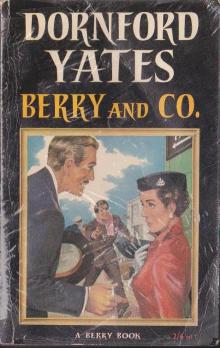 Berry and Co.
Berry and Co. Jonah and Co.
Jonah and Co.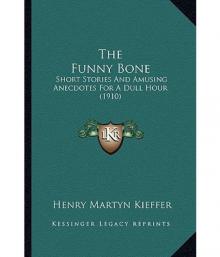 The Funny Bone: Short Stories and Amusing Anecdotes for a Dull Hour
The Funny Bone: Short Stories and Amusing Anecdotes for a Dull Hour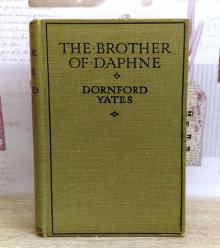 The Brother of Daphne
The Brother of Daphne Courts of Idleness
Courts of Idleness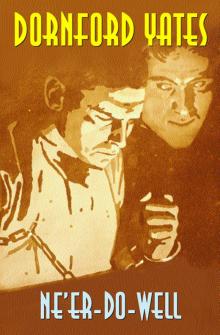 Ne'er Do Well
Ne'er Do Well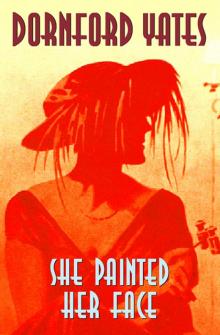 She Painted Her Face
She Painted Her Face Safe Custody and Laughing Bacchante
Safe Custody and Laughing Bacchante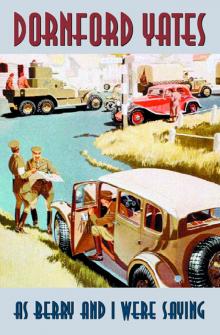 As Berry and I Were Saying
As Berry and I Were Saying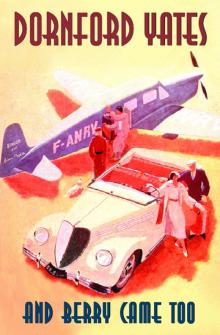 And Berry Came Too
And Berry Came Too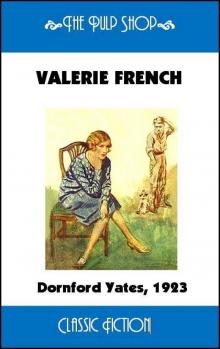 Valerie French (1923)
Valerie French (1923) Brother of Daphne
Brother of Daphne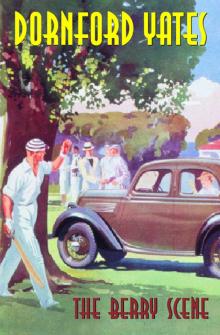 Berry Scene
Berry Scene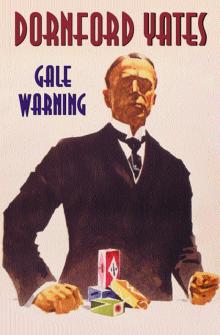 Gale Warning
Gale Warning B-Berry and I Look Back
B-Berry and I Look Back Storm Music (1934)
Storm Music (1934)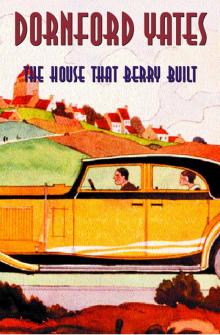 House That Berry Built
House That Berry Built